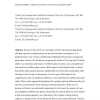Free Online Productivity Tools
i2Speak
i2Symbol
i2OCR
iTex2Img
iWeb2Print
iWeb2Shot
i2Type
iPdf2Split
iPdf2Merge
i2Bopomofo
i2Arabic
i2Style
i2Image
i2PDF
iLatex2Rtf
Sci2ools
111
click to vote
JOLLI
2008
2008
Age Differences in Adults' Use of Referring Expressions
The aim of this article is to investigate whether choosing the appropriate referring expression requires taking into account the hearer's perspective, as is predicted under some versions of bidirectional Optimality Theory but is unexpected under other versions. We did this by comparing the results of 25 young and 25 elderly adults on an elicitation task based on 8 different picture stories, and a comprehension task based on 8 similar written stories. With respect to the elicitation task, we found that elderly adults produce pronouns significantly more often than young adults when referring to the old topic in the presence of a new topic. With respect to the comprehension task, no significant differences were found between elderly and young adults. These results support the hypothesis that speakers optimize bidirectionally and take into account hearers when selecting a referring expression. If the use of a pronoun will lead to an unintended interpretation by the hearer, the speaker...
Related Content
| Added | 13 Dec 2010 |
| Updated | 13 Dec 2010 |
| Type | Journal |
| Year | 2008 |
| Where | JOLLI |
| Authors | Petra Hendriks, Christina Englert, Ellis Wubs, John Hoeks |
Comments (0)

